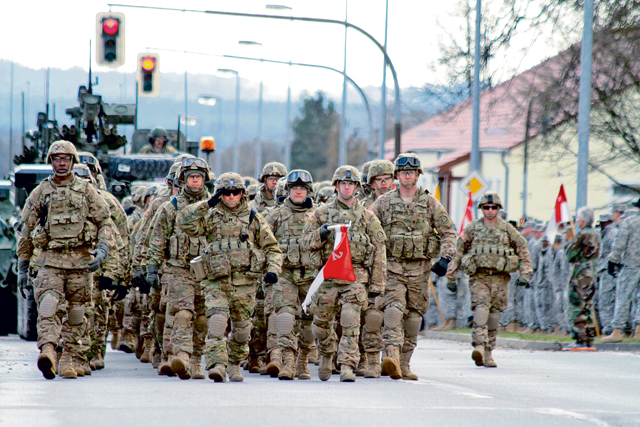
PRAGUE, Czech Republic — On March 31, three convoys carrying U.S. Soldiers, Stryker-armored vehicles and support crews from NATO bases in the Baltic States and Poland, converged on the Czech Army’s Prague-Ruzyne Barracks.
These men and women participated in Dragoon Ride, an operational movement in which 3rd Squadron, 2nd Cavalry Regiment drove their vehicles as far as 1,100 miles through five NATO-allied countries and back to Rose Barracks, Vilseck, Germany.
Dragoon Ride was a capstone exercise for 3-2 CAV’s rotation under Atlantic Resolve-North, where units under U.S. Army in Europe trained with allied nations from the Baltics and Poland.
The 16th Sustainment Brigade’s 39th Transportation Battalion logistically supported Dragoon Ride with teams of quartermaster and transportation Soldiers attached to each troop of Stryker-armored vehicles, known as the Convoy Support Teams.
“The maneuver units need support whether it is fuel, food, water, or maintenance support,” said 2nd Lt. Kyle Hensley, CST commander for Kilo Troop, 3-2 CAV. “The Convoy Support Team is that in a nutshell.”
The three CSTs issued more than 12,000 gallons of fuel across three different routes, recovered six vehicles and repaired five of the vehicles on-site.
“As an echelons-above-brigade (support) unit, we really don’t get the opportunity to work with infantrymen on a daily basis,” said Lt. Col. Steve Dowgielewicz, 39th Transportation Battalion commander. “This will really give us a great opportunity to see how they do business and how we can support them in the future.”
CST Commander 1st Lt. Lauren Lybbert was slated to command a convoy of Strykers under Lighting Troop, 3-2 CAV, when her radio malfunctioned.
She jumped onto a Lightning Troop Stryker to command the convoy and safely arrived in Krakow, Poland.
“Standing out of the hatch while you’re going 80 (kilometers per hour) … bugs hit you in the face … it was a totally new experience for me to see how (the cavalrymen) fight out of (Strykers),” Lybbert said. “This helps us understand what the combat units need and how we as sustainers, can better support them.”
Dragoon Ride improved more than just internal operations.
“Working with host nations has been an experience that I think our Soldiers will never forget,” Hensley said.
Crowds of Estonian, Latvian, Lithuanian, Polish, Czech and German citizens gathered along the convoys’ routes to greet the passing American Soldiers with U.S. flags, gifts and warm hugs. The Soldiers would take time during each rest stop to talk to supporters and show them their vehicles.
“Up until the mission, we were getting briefs about possible protests,” Hensley added. “What amazed me is the amount of (local) people who would stand out at 9 p.m. in the freezing cold, rain and snow to see us drive down the road. That itself was a life-changing experience and made us appreciate what we do.”
The logistics Soldiers supported the cavalrymen all the way to the end at Rose Barracks. On April 2, helicopters flew over as columns of cavalrymen marched their Strykers with M969 fuel tankers through cheering crowds and rows of U.S. flags in front of their regimental headquarters at Rose Barracks.
After the parade, logistical Soldiers and military police attached to the convoy received a pair of silver spurs from the 2nd Cavalry Regiment, traditionally only awarded to Soldiers assigned to cavalry units.
As day broke the next morning, the fuel and transportation specialists mounted up once again, continuing another 450 kilometers, roughly 280 miles, before they reached their home in Smith Barracks, Baumholder, Germany.


